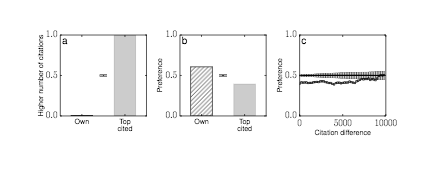publications
Send us a link
Survey of Wellcome Researchers and Their Attitudes to Open Research
Survey of Wellcome Researchers and Their Attitudes to Open Research
Results of a survey of Wellcome researchers to find out what they think about open research, how they practice it, and some of the barriers they face.

We Read Spam a Lot
Prospective cohort study of unsolicited and unwanted academic invitations.
How Many Scientific Papers Are Mentioned in Policy-Related Documents?
An empirical investigation using Web of Science and Altmetric data investigates how many papers are mentioned in policy-related documents. We find that less than 0.5% of the papers published in different subject categories are mentioned at least once in policy-related documents. Based on our results, we recommend that the analysis of (WoS) publications with at least one policy-related mention is repeated regularly (annually). Mentions in policy-related documents should not be used for impact measurement until new policy-related sites are tracked.
Amplifying the impact of open access: Wikipedia and the diffusion of science
Amplifying the impact of open access: Wikipedia and the diffusion of science
With the rise of Wikipedia as a first‐stop source for scientific information, it is important to understand whether Wikipedia draws upon the research that scientists value most. Here we identify the 250...

Preventing the Ends from Justifying the Means
Preventing the Ends from Justifying the Means
Withholding results to address publication bias in peer-review

Guidelines on Good Science Publishing
French, German, and UK's joint guidelines for high-quality publications in scientific journals.
How Long Do Top Scientists Maintain Their Stardom?
Research performance of all Italian professors in the sciences over three consecutive four-year periods.

The Proof of the Pudding: University Responses to The European Research Council
SciLite
A platform for displaying text-mined annotations as a means to link research articles with biological data
Accelerating Translational Research through Open Science
Seeking to accelerate research advances and reimagine its role in the community, the Montreal Neurological Institute (Neuro) announced in the spring of 2016 that it is launching a five-year experiment during which it will adopt Open Science—open data, open materials, and no patenting—across the institution.
Higher Education Funding Council
A document that sets out the proposals of the four UK higher education funding bodies for the second Research Excellence Framework (REF) for the assessment of research in UK higher education institutions. The proposals seek to build on the first REF conducted in 2014, and to incorporate the principles identified in Lord Stern’s Independent Review of the REF.
Are Early Career Researchers the Harbingers of Change?
Part one of a longitudinal study over three years about the behaviour of researchers under 35 who have yet to achieve established or tenured positions.
Swiss Army Knives of Scholarly Communication
A few slides comparing ResearchGate, Academia, Mendeley and others.
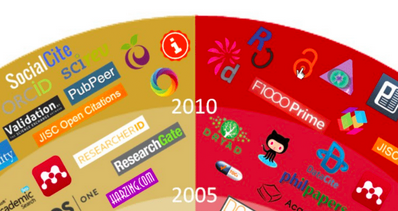
Methodologies for Identification and Assessment of Interdisciplinary Research
Methodologies for Identification and Assessment of Interdisciplinary Research
Choice of data, methodology and indicators can produce seriously inconsistent results despite a common set of disciplines and countries.
Can Paid Reviews Promote Scientific Quality and Offer Novel Career Perspectives for Young Scientists?
Can Paid Reviews Promote Scientific Quality and Offer Novel Career Perspectives for Young Scientists?
Community driven paid reviews could work in conjunction with a feed-back loop to young scientists. This promote the integration of reviews into an academic career.
10 Simple Rules for Developing Public Biological Databases
10 Simple Rules for Developing Public Biological Databases
If you are considering developing a new database, please, for the love of science, follow these 10 simple rules for creating and maintaining (biological) databases.
TrialsTracker
A tool was produced that identifies all completed trials from clinicaltrials.gov, searches for results in the clinicaltrials.gov registry and on PubMed, and presents summary statistics for each sponsor online. Since Jan 2006, trial sponsors included in our dataset have completed 25,927 eligible trials, of which 11,714 (45.2%) have failed to make results available.
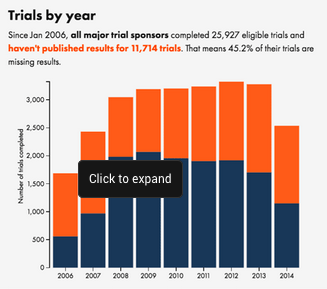
Two-stage Calls - A real improvement in times of low success rates?
The relatively low success rates for applicants in most parts of Horizon 2020 have been heavily and unanimously criticized by the stakeholders. In response, the European Commission introduced more generally a proposal evaluation in two stages, in order to ease the burden of unsuccessful applicants during the first stage. This approach received a very positive feedback from the scientific communities.
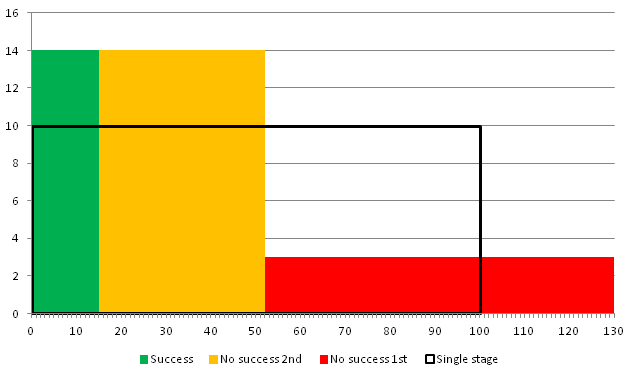
Evaluating the Non-academic Impact of Academic Research
Evaluation of academic research plays a significant role in government efforts to steer public universities. The scope of such evaluation is now being extended to include the ‘relevance’ or ‘impact’ of academic research outside the academy. We address how evaluation of non-academic research impact can promote more such impact without undermining academic freedom and research excellence.
Peer-Review 'Heroes' Do Lion's Share of the Work
Peer-Review 'Heroes' Do Lion's Share of the Work
20% of the scientists undertook between 69% and 94% of reviews last year.

Single-blind vs Double-blind Peer Review in the Setting of Author Prestige
Single-blind vs Double-blind Peer Review in the Setting of Author Prestige
This study investigates whether bias with single-blind review is greatest in a setting of author or institutional prestige.
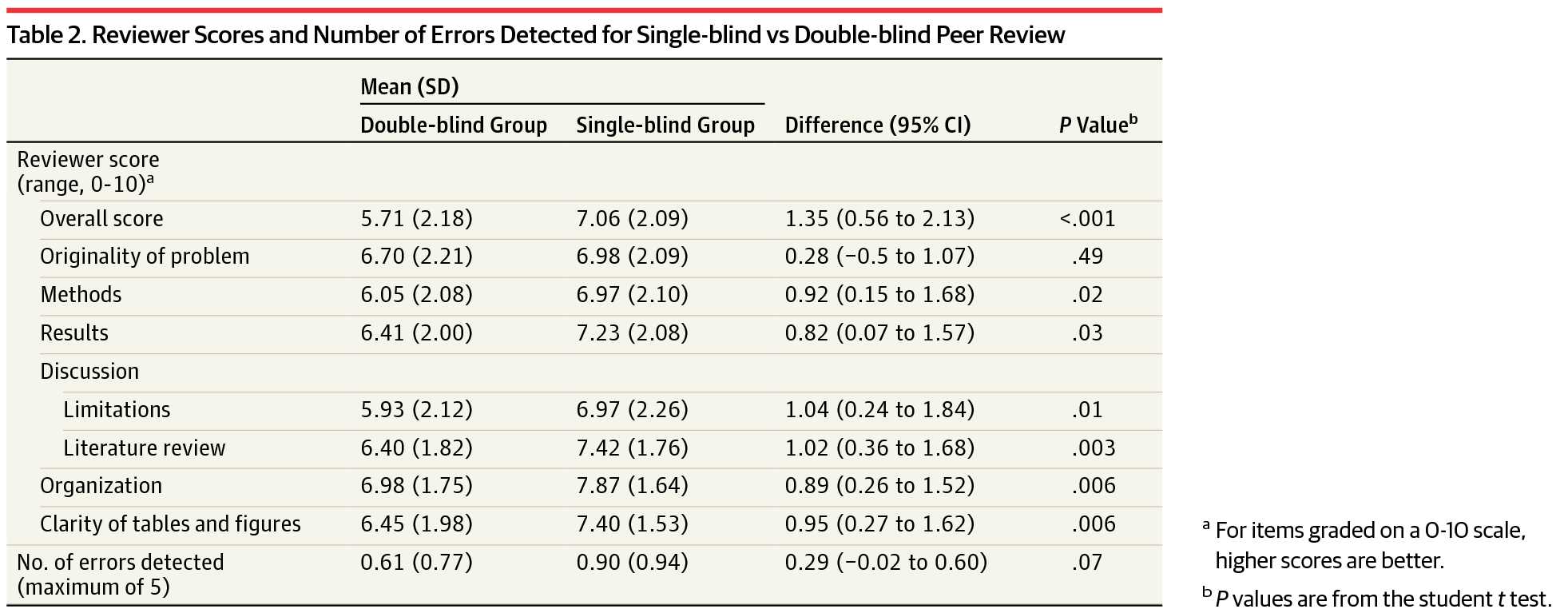
Open-Access Mega-Journals: A Bibliometric Profile
While the total output of the eleven open-access mega-journals grew by 14.9% between 2014 and 2015, this growth is largely attributable to the increased output of Scientific Reports and Medicine.
Twitter Predicts Citation Rates of Ecological Research
Twitter activity is a more important predictor of citation rates than 5-year journal impact factor. Moreover, Twitter activity is not driven by journal impact factor; the ‘highest-impact’ journals were not necessarily the most discussed online.
The Global Burden of Journal Peer Review in the Biomedical Literature: Strong Imbalance in the Collective Enterprise
The Global Burden of Journal Peer Review in the Biomedical Literature: Strong Imbalance in the Collective Enterprise
Mathematical model estimating the overall quantitative annual demand for peer review and the supply in biomedical research.
The Academic, Economic and Societal Impacts of Open Access
While deceptive publishing remains an ongoing issue, particularly in the developing world, increasing public engagement, development of OA policies, and discussion of sustainable and ethical publishing practices can remove this potential threat.
